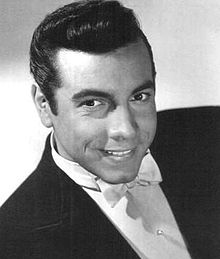Mario Lanza | |
|---|---|
 MGM still of Mario Lanza, circa 1950 | |
| Born | Alfredo Arnold Cocozza January 31, 1921 Philadelphia, Pennsylvania, U.S. |
| Died | October 7, 1959 (aged 38) Rome, Italy |
| Education | Berkshire Music Center |
| Occupations |
|
| Years active | 1942–1959 |
| Spouse |
Betty Lanza (m. 1945) |
| Children | 4 |
Mario Lanza (US: /ˈlɑːnzə, ˈlænzə/ LA(H)N-zə, Italian: [ˈmaːrjo ˈlantsa]; born Alfredo Arnold Cocozza [alˈfreːdo koˈkottsa]; January 31, 1921 – October 7, 1959) was an American tenor and actor. He was a Hollywood film star popular in the late 1940s and the 1950s. Lanza began studying to be a professional singer at the age of 16. After appearing at the Hollywood Bowl in 1947, Lanza signed a seven-year film contract with Louis B. Mayer, the head of Metro-Goldwyn-Mayer, who saw his performance and was impressed by his singing. Prior to that, the adult Lanza sang only two performances of an opera. The following year (1948) he sang the role of Pinkerton in Puccini's Madama Butterfly in New Orleans.[1]
His film debut for MGM was in That Midnight Kiss (1949) with Kathryn Grayson and Ethel Barrymore. A year later, in The Toast of New Orleans, his featured popular song "Be My Love" became his first million-selling hit. In 1951, he starred as tenor Enrico Caruso, his idol, in the biopic The Great Caruso, which produced another million-seller with "The Loveliest Night of the Year" (a song which used the melody of Sobre las Olas). The Great Caruso was the 11th top-grossing film that year.[2]
The title song of his next film, Because You're Mine, was his final million-selling hit song. The song went on to receive an Academy Award nomination for Best Original Song. After recording the soundtrack for his next film, The Student Prince, he embarked upon a protracted battle with studio head Dore Schary arising from artistic differences with director Curtis Bernhardt, and was eventually fired by MGM.[3]
Lanza was known to be "rebellious, tough, and ambitious".[4] During most of his film career, he suffered from addictions to overeating and alcohol which had a serious effect on his health and his relationships with directors, producers and, occasionally, other cast members. Hollywood columnist Hedda Hopper writes that "his smile, which was as big as his voice, was matched with the habits of a tiger cub, impossible to housebreak." She adds that he was the "last of the great romantic performers".[5] He made three more films before dying of an apparent pulmonary embolism at the age of 38. At the time of his death in 1959, he was still "the most famous tenor in the world".[6] Author Eleonora Kimmel concludes that Lanza "blazed like a meteor whose light lasts a brief moment in time".[7]
- ^ Bessette, Roland L. Mario Lanza: Tenor in Exile, Amadeus (1999), p. 65
- ^ "The Numbers - Top-Grossing Movies of 1951".
- ^ "Mario Lanza". IMDb.com.
- ^ Cite error: The named reference
Fischerwas invoked but never defined (see the help page). - ^ Hopper, Hedda. The Whole Truth and Nothing But, Pyramid Books (1963), chapter 18.
- ^ Cite error: The named reference
Manneringwas invoked but never defined (see the help page). - ^ Kimmel, Eleonora. Altered and Unfinished Lives, A.F.A. (2006) p. 191.